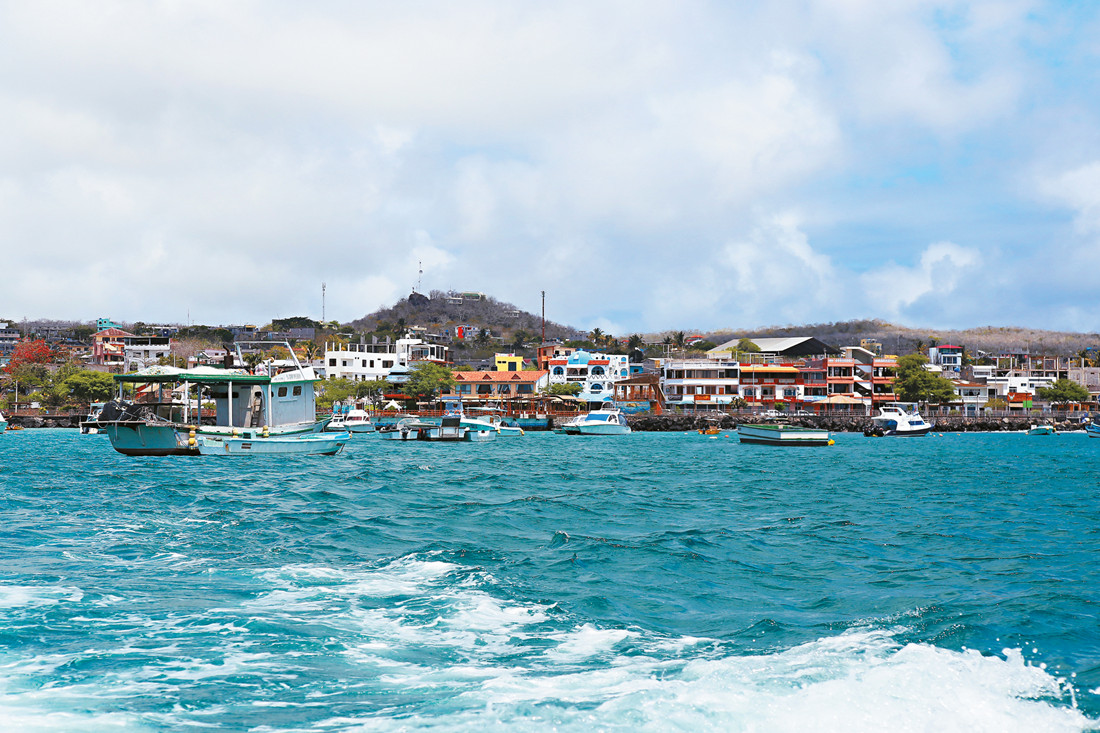Accusations of predatory fishing practices by Chinese fishing fleet near Galapagos slammed by experts
By Chen Shasha and Cao Siqi Source: Global Times Published: 2020/8/14 1:27:26

Puerto Baquerizo Moreno is one of the most populated ports in the Galápagos Islands, Ecuador. Photo: VCG
As China has become more powerful on the ocean, the country's normal, legal fishing operations have increasingly become a pawn that the US uses to sow discord and incite conflicts with neighboring countries.Facing slander by the current US administration, which likely has the worst track record on environmental protection and continues to savage established conservation laws, Chinese senior oceanography experts slammed US officials, including Secretary of State Michael Pompeo, for not caring about sharks or the environment, and only aiming to fan the flames of anti-China sentiment around the globe.
Vicious slander
In his latest move, Pompeo accused China's commercial fishing fleet of "routinely violating the sovereign rights and jurisdiction of coastal states, fishing without permission, and overfishing licensing agreements," citing an incident involving a fishing fleet with over 200 vessels, most of them China-flagged, fishing near Ecuador's Galapagos marine reserve.
Refuting Pompeo's slander, the Chinese Embassy in Ecuador has stated that the Chinese fishing boats were operating routinely and legally in waters outside the exclusive economic zone of the Galapagos, and posed no threat to anyone.
Pompeo accused the fishing fleet of being engaged in "illegal, unreported, and unregulated" (IUU) fishing, and "rule-breaking and willful environmental degradation."
Li Gang, head of the Chinese Delegation of the Scientific Committee with the South Pacific Regional Fisheries Management Organisation (SPRFMO), said that the Chinese fishing vessels are legal fishing vessels authorized by the Chinese government and registered with SPRFMO in accordance with the regulations concerning conservation and fishery management measures.
SPRFMO is an inter-governmental organization that is committed to the long-term conservation and sustainable use of the fishery resources of the South Pacific Ocean and in so doing safeguarding the marine ecosystems in which the resources occur.
"No Chinese fishing vessel has been included in the IUU vessel list of SPRFMO since the establishment of the organization in 2013," said Li, who is also an associate professor at Shanghai Ocean University, at a seminar held in Shanghai Ocean University on Wednesday.
Some media reports claimed that Chinese fishers killed protected species and sharks for their fins, posting pictures of law enforcement workers checking shark fins on boat as an evidence, to which Li said the boat in the photo is not a vessel for squid fishing and there is no indication of its nationality.
Moreover, SPRFMO has not implemented the boarding inspection in the convention of the high seas yet, so it is impossible for law enforcement officers to board the fishing vessels to conduct such inspections, Li noted, slamming such reports of intentionally confusing the readers.
Some media reports acknowledged Chinese squid fishing vessels on the high seas are legal, but then claimed that such an act violated the marine reserve protection and harmed sharks.
Li explained that squid fishing, usually takes place at night and the fishers use an overhead light to attract the squid to gather at the shaded area under the boat and then catch the squid with a specially made gear that has no bait.
Such fishing gear that Chinese vessels use is of a highly selective nature and is eco-friendly as advocated by the international community, Li told the Global Times on Wednesday. "There is almost no 'bycatch' such as seabirds, sharks, turtles and other marine mammals."
Joint cooperation
Ecuadorian foreign minister said the country will be surveilling Chinese fishing fleets near the Galapagos Islands and they expect to hold bilateral talks with the Chinese side over Chinese fishing activity near the Galapagos Islands.
At a routine press briefing on August 6, Chinese Foreign Ministry spokesperson Wang Wenbin said China and Ecuador are in friendly communication these days through bilateral channels.
Meanwhile, to contribute "our efforts in the protection of fishery resources in the region, China's fishery authority has decided to ban fishing in the high seas west of the Galapagos Islands Marine Reserve from September to November this year, which has been appreciated by Ecuador and other relevant countries," Wang said.
"China's fishing ban is not due to pressure from the US," Chen Xinjun, team leader of Squid Jigging Technology Group of China Distant Water Fisheries Association and professor of Shanghai Ocean University, told the Global Times, adding that it is the first country to implement a fishing ban in international waters.
Li explained that the measures are meant to promote the protection and sustainable use of fishery resources in international waters by the international community, especially in waters and resources not included in the management of the international regional fishery organizations like squid resources in the southwestern Atlantic.
Effective conservation of fishery resource requires concerted efforts from governments, enterprises, scientists, fishers and the public.
"The fishing ban is telling the international community that China is a responsible fishing country and is willing to take the lead in high seas fishery management," Li said.
Earlier in June, China's Ministry of Agriculture and Rural Affairs instituted a fishing moratorium for Chinese vessels in key fishing grounds, which include a ban on fishing in the southwestern Atlantic from July to September and the eastern Pacific from September to November, in a bid to protect squid resources and their spawning groups.
RELATED ARTICLES:
Posted in: SOCIETY,INDUSTRIES